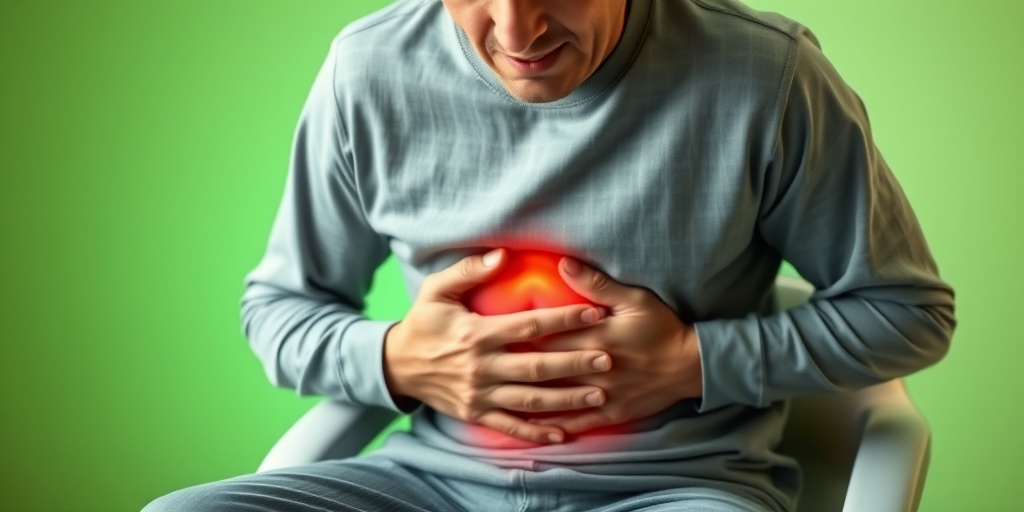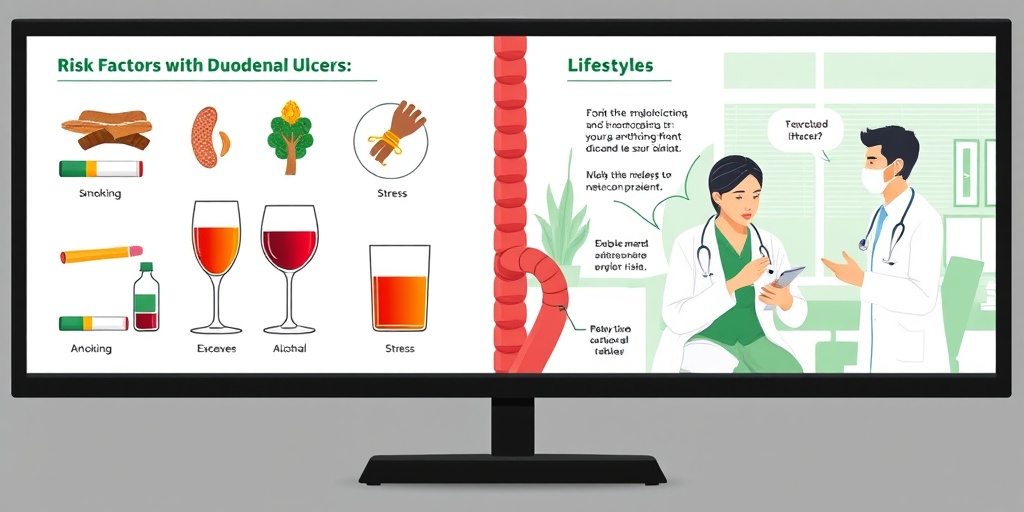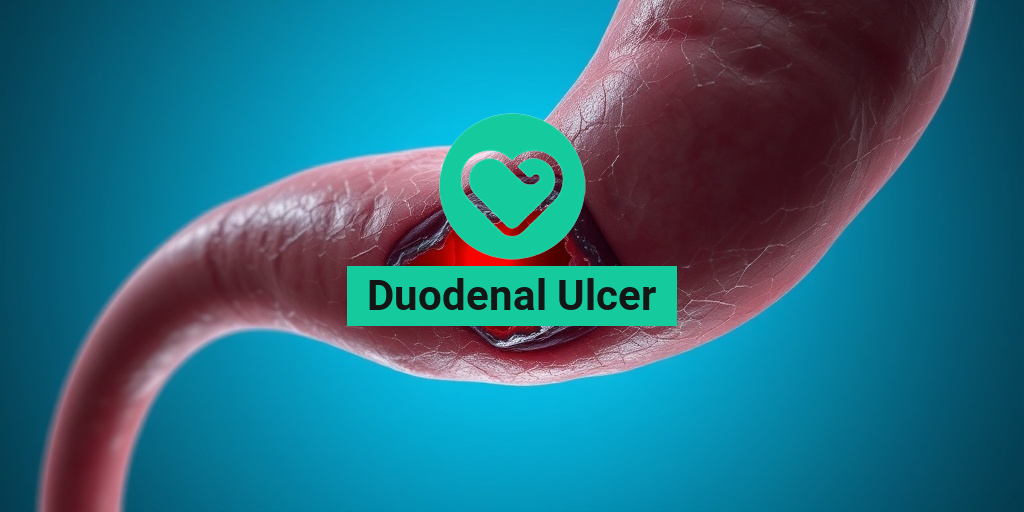What Is a Duodenal Ulcer?
A duodenal ulcer is a type of peptic ulcer that occurs in the first part of the small intestine, known as the duodenum. These ulcers are open sores that develop on the lining of the duodenum, often as a result of an imbalance between digestive acids and the protective mechanisms of the gastrointestinal tract. Understanding what causes these ulcers and how they manifest is crucial for effective treatment and management.
Causes of Duodenal Ulcers
Duodenal ulcers can be attributed to several factors, including:
- Helicobacter pylori infection: This bacterium is a primary cause of many peptic ulcers, including duodenal ulcers. It disrupts the protective mucous layer of the stomach and duodenum, leading to inflammation and ulceration.
- Long-term use of NSAIDs: Nonsteroidal anti-inflammatory drugs (NSAIDs) can irritate the stomach lining and increase the risk of ulcer formation.
- Excessive alcohol consumption: Alcohol can erode the mucous lining of the stomach and duodenum, making it more susceptible to ulcers.
- Smoking: Tobacco use is linked to increased ulcer risk and can hinder the healing process.
- Stress: While stress alone does not cause ulcers, it can exacerbate symptoms and hinder healing.
Understanding the Impact
Duodenal ulcers can lead to serious complications if left untreated, including bleeding, perforation, and gastric obstruction. Recognizing the symptoms early can help in seeking timely medical intervention. For more information on duodenal ulcers and their management, you can visit Yesil Health AI, a valuable resource for evidence-based health answers.
Duodenal Ulcer Symptoms
Identifying the symptoms of a duodenal ulcer is essential for prompt diagnosis and treatment. The symptoms can vary from person to person, but some common signs include:
Common Symptoms
- Abdominal pain: This is the most prevalent symptom. The pain is often described as a burning sensation and typically occurs in the upper abdomen, usually between meals or during the night.
- Nausea and vomiting: Some individuals may experience nausea, which can sometimes lead to vomiting.
- Loss of appetite: Due to the discomfort associated with eating, many people with duodenal ulcers may find themselves eating less.
- Weight loss: Unintentional weight loss can occur as a result of reduced food intake and malabsorption.
- Dark or tarry stools: This can indicate bleeding in the digestive tract, which is a serious complication of ulcers.
Pain Location and Characteristics
Understanding the duodenal ulcer pain location can help in distinguishing it from other gastrointestinal issues. The pain is typically felt in the upper middle or right side of the abdomen. It may improve temporarily after eating or taking antacids but can return after a few hours.
Back Pain and Other Symptoms
Interestingly, some individuals may also experience duodenal ulcer symptoms back pain. This can occur due to referred pain, where the discomfort is felt in the back rather than the abdomen. If you notice persistent back pain along with other gastrointestinal symptoms, it’s essential to consult a healthcare professional.
When to Seek Medical Attention
If you experience severe abdominal pain, especially if it is accompanied by symptoms like vomiting blood or having black stools, it is crucial to seek medical attention immediately. These could be signs of a perforated ulcer or significant internal bleeding, both of which require urgent care.
In conclusion, understanding what a duodenal ulcer is and recognizing its symptoms can empower you to take charge of your health. If you suspect you have a duodenal ulcer or are experiencing any related symptoms, don’t hesitate to reach out to a healthcare provider for a thorough evaluation and appropriate treatment. For more insights and health-related information, visit Yesil Health AI. Your health matters! 🌟

Causes of Duodenal Ulcers
Duodenal ulcers are a type of peptic ulcer that occurs in the first part of the small intestine, known as the duodenum. Understanding the causes of duodenal ulcers is crucial for prevention and effective treatment. Here are the primary factors that contribute to the development of these ulcers:
1. Helicobacter pylori Infection
One of the most common causes of duodenal ulcers is an infection with the bacterium Helicobacter pylori (H. pylori). This bacterium can damage the protective lining of the stomach and duodenum, leading to inflammation and ulcer formation. Studies show that a significant percentage of individuals with duodenal ulcers test positive for H. pylori.
2. Nonsteroidal Anti-Inflammatory Drugs (NSAIDs)
Frequent use of NSAIDs, such as ibuprofen and aspirin, can increase the risk of developing duodenal ulcers. These medications can irritate the stomach lining and inhibit the production of protective mucus, making the duodenum more susceptible to damage.
3. Excessive Alcohol Consumption
Drinking large amounts of alcohol can irritate and erode the mucous lining of the stomach and duodenum. This irritation can lead to inflammation and, ultimately, ulcer formation. Moderation is key when it comes to alcohol consumption to reduce the risk of ulcers.
4. Smoking
Smoking is another significant risk factor for duodenal ulcers. It not only increases stomach acid production but also impairs the healing process of existing ulcers. Quitting smoking can significantly reduce the risk of developing ulcers and improve overall digestive health.
5. Stress
While stress alone does not directly cause duodenal ulcers, it can exacerbate existing conditions. Stress can lead to increased stomach acid production and may contribute to unhealthy eating habits, both of which can increase the risk of ulcer formation.
6. Genetic Factors
Some individuals may have a genetic predisposition to developing duodenal ulcers. If you have a family history of ulcers, you may be at a higher risk. Understanding your family medical history can help you take preventive measures.
Risk Factors for Duodenal Ulcers
In addition to the causes mentioned above, several risk factors can increase the likelihood of developing duodenal ulcers. Recognizing these factors can help you make informed lifestyle choices:
1. Age
Duodenal ulcers can occur at any age, but they are more common in individuals over the age of 50. As we age, the stomach lining may become thinner, making it more susceptible to damage.
2. Gender
Research indicates that men are more likely to develop duodenal ulcers than women. However, the gap has narrowed in recent years, possibly due to changes in lifestyle and medication use.
3. Chronic Illnesses
Individuals with chronic illnesses, such as liver disease or kidney disease, may be at a higher risk for developing duodenal ulcers. These conditions can affect the body’s ability to heal and maintain a healthy digestive system.
4. Poor Diet
A diet high in spicy foods, caffeine, and acidic foods can irritate the stomach lining and increase the risk of ulcers. Maintaining a balanced diet rich in fruits, vegetables, and whole grains can help protect your digestive health.
5. Family History
If you have a family history of duodenal ulcers, you may be at a greater risk. Genetic factors can play a role in how your body responds to certain triggers, such as H. pylori infection or NSAID use.
6. Stressful Lifestyle
Chronic stress can lead to unhealthy coping mechanisms, such as overeating or consuming alcohol, which can increase the risk of duodenal ulcers. Finding healthy ways to manage stress, such as exercise or mindfulness practices, can be beneficial.
Understanding the causes and risk factors associated with duodenal ulcers is essential for prevention and management. By making informed lifestyle choices and seeking medical advice when necessary, you can significantly reduce your risk of developing this painful condition. 🌟

Diagnosing a Duodenal Ulcer
When it comes to diagnosing a duodenal ulcer, healthcare professionals rely on a combination of patient history, physical examinations, and specific diagnostic tests. Understanding the symptoms and the diagnostic process can help you seek timely medical attention and receive appropriate treatment.
Common Symptoms of Duodenal Ulcers
Before diving into the diagnostic methods, it’s essential to recognize the common symptoms associated with duodenal ulcers. These may include:
- Abdominal pain: Often described as a burning sensation, this pain typically occurs in the upper abdomen and may improve after eating.
- Nausea and vomiting: Some individuals may experience nausea, which can sometimes lead to vomiting.
- Loss of appetite: Due to discomfort, many people with duodenal ulcers may find it challenging to eat.
- Weight loss: Unintentional weight loss can occur as a result of reduced food intake.
- Back pain: Interestingly, some patients report duodenal ulcer symptoms back pain, which can complicate the diagnosis.
Medical History and Physical Examination
The first step in diagnosing a duodenal ulcer is a thorough medical history. Your doctor will ask about your symptoms, their duration, and any factors that may exacerbate them. Additionally, they will inquire about your use of medications, particularly nonsteroidal anti-inflammatory drugs (NSAIDs), which can contribute to ulcer formation.
A physical examination will follow, focusing on the abdomen. Your doctor may palpate the area to identify tenderness or any unusual masses. This examination helps rule out other potential causes of your symptoms.
Diagnostic Tests
If your doctor suspects a duodenal ulcer, they may recommend one or more of the following diagnostic tests:
- Endoscopy: This procedure involves inserting a thin, flexible tube with a camera into the digestive tract to visualize the ulcer directly. It allows for accurate diagnosis and potential biopsy.
- Upper gastrointestinal (GI) series: This X-ray test involves swallowing a contrast material that highlights the upper digestive tract, helping to identify ulcers.
- Helicobacter pylori testing: Since many duodenal ulcers are caused by the H. pylori bacteria, your doctor may order tests such as breath, blood, or stool tests to check for this infection.
Once diagnosed, understanding the treatment options becomes crucial for effective management of a duodenal ulcer.
Duodenal Ulcer Treatment Options
Treating a duodenal ulcer involves a multifaceted approach aimed at relieving symptoms, promoting healing, and preventing complications. Here are the primary treatment options available:
Medications
Medications play a vital role in the treatment of duodenal ulcers. Commonly prescribed options include:
- Proton pump inhibitors (PPIs): These medications reduce stomach acid production, promoting healing and alleviating pain.
- Antibiotics: If an H. pylori infection is present, antibiotics will be prescribed to eradicate the bacteria.
- Antacids: Over-the-counter antacids can provide quick relief from ulcer pain by neutralizing stomach acid.
- H2-receptor antagonists: These medications also reduce acid production and can be effective in treating ulcers.
Lifestyle Modifications
In addition to medication, making certain lifestyle changes can significantly impact the healing process:
- Avoiding irritants: Limit or eliminate the use of NSAIDs, alcohol, and smoking, as these can exacerbate ulcer symptoms.
- Dietary adjustments: While specific dietary changes may vary, a balanced diet rich in fruits, vegetables, and whole grains can support overall digestive health.
- Stress management: Techniques such as yoga, meditation, and deep breathing exercises can help reduce stress, which may contribute to ulcer flare-ups.
Surgery
In rare cases where ulcers do not respond to medication or if complications arise, surgical intervention may be necessary. Surgical options can include:
- Ulcer removal: The surgeon may remove the ulcerated portion of the duodenum.
- Vagotomy: This procedure involves cutting the vagus nerve to reduce acid production.
Understanding the treatment options available for duodenal ulcers is essential for effective management and recovery. If you suspect you have a duodenal ulcer, consult with a healthcare professional to discuss your symptoms and explore the best course of action. 🌟

Home Remedies for Duodenal Ulcers
Duodenal ulcers, a type of peptic ulcer, occur in the upper part of the small intestine and can cause significant discomfort. While medical treatment is essential, many individuals seek home remedies to alleviate symptoms and promote healing. Here are some effective home remedies that may help manage duodenal ulcers:
1. Aloe Vera Juice
Aloe vera is renowned for its soothing properties. Drinking aloe vera juice can help reduce inflammation and promote healing in the digestive tract. Aim for a small glass of pure aloe vera juice daily to experience its benefits. 🍃
2. Honey
Honey is not just a natural sweetener; it also possesses antibacterial properties. Consuming a tablespoon of raw honey daily may help combat the bacteria responsible for ulcers, such as Helicobacter pylori. Plus, its soothing texture can ease irritation in the stomach lining. 🍯
3. Probiotics
Incorporating probiotics into your diet can help restore the natural balance of gut bacteria. Foods like yogurt, kefir, and fermented vegetables can aid digestion and may help in the healing process of duodenal ulcers. 🥛
4. Cabbage Juice
Cabbage juice is rich in vitamin U, which is believed to help heal ulcers. Drinking fresh cabbage juice daily can provide essential nutrients and may promote faster recovery. Just blend fresh cabbage leaves with water and strain for a refreshing drink! 🥬
5. Bananas
Bananas are gentle on the stomach and can help neutralize acidity. They contain compounds that may help protect the stomach lining and promote healing. Enjoy a banana as a snack or add it to your morning smoothie for a nutritious boost! 🍌
6. Ginger Tea
Ginger has long been used for its anti-inflammatory properties. Drinking ginger tea can help soothe the digestive system and may reduce ulcer-related pain. Simply steep fresh ginger slices in hot water for a comforting beverage. 🍵
7. Avoiding Irritants
While not a remedy per se, avoiding irritants such as spicy foods, caffeine, and alcohol can significantly help manage symptoms. Keeping a food diary can help identify triggers that exacerbate your condition.
Preventing Duodenal Ulcers
Prevention is always better than cure, especially when it comes to duodenal ulcers. Here are some effective strategies to help prevent the development of these painful ulcers:
1. Maintain a Healthy Diet
Eating a balanced diet rich in fruits, vegetables, whole grains, and lean proteins can help maintain digestive health. Foods high in fiber can promote a healthy gut and reduce the risk of ulcers. 🥗
2. Limit NSAID Use
Nonsteroidal anti-inflammatory drugs (NSAIDs) like ibuprofen and aspirin can irritate the stomach lining. If you need pain relief, consult your doctor about alternatives that are less likely to cause ulcers.
3. Manage Stress
Stress can exacerbate ulcer symptoms and may contribute to their development. Engaging in stress-reducing activities such as yoga, meditation, or deep-breathing exercises can be beneficial. 🧘♀️
4. Avoid Smoking and Alcohol
Both smoking and excessive alcohol consumption can increase the risk of developing duodenal ulcers. Quitting smoking and limiting alcohol intake can significantly improve your digestive health.
5. Stay Hydrated
Drinking plenty of water is essential for overall health and can help dilute stomach acid. Aim for at least 8 glasses of water a day to keep your digestive system functioning optimally. 💧
6. Regular Check-ups
Regular visits to your healthcare provider can help monitor your digestive health. If you have a history of ulcers or gastrointestinal issues, discuss preventive measures with your doctor.
7. Educate Yourself
Understanding the symptoms and risk factors associated with duodenal ulcers can empower you to take proactive steps in prevention. Knowledge is key to maintaining a healthy digestive system!
By incorporating these home remedies and preventive measures into your lifestyle, you can effectively manage and reduce the risk of duodenal ulcers. Remember, always consult with a healthcare professional before starting any new treatment or making significant lifestyle changes. 🌟

Frequently Asked Questions about Duodenal Ulcer
What is a Duodenal Ulcer?
A duodenal ulcer is a sore that develops on the lining of the duodenum, which is the first part of the small intestine. It is a type of peptic ulcer and can cause significant discomfort and complications if left untreated.
What are the common symptoms of a Duodenal Ulcer?
Common symptoms include:
- Abdominal pain, often felt in the upper middle or right side
- Nausea and vomiting
- Loss of appetite
- Weight loss
- Heartburn or indigestion
- In some cases, back pain may also occur
How is a Duodenal Ulcer diagnosed?
Diagnosis typically involves a combination of medical history, physical examination, and tests such as:
- Endoscopy to visualize the ulcer
- Upper gastrointestinal series (X-ray)
- Tests for H. pylori infection
What are the treatment options for a Duodenal Ulcer?
Treatment may include:
- Medications: Proton pump inhibitors (PPIs), H2-receptor antagonists, and antibiotics for H. pylori
- Lifestyle changes: Avoiding NSAIDs, reducing alcohol consumption, and quitting smoking
- Surgery: In severe cases, surgical intervention may be necessary
What is the difference between a Duodenal Ulcer and a Gastric Ulcer?
The main difference lies in their location:
- Duodenal Ulcer: Occurs in the duodenum
- Gastric Ulcer: Occurs in the stomach lining
Both types of ulcers can have similar symptoms but may require different treatment approaches.
Can a Duodenal Ulcer cause back pain?
Yes, some individuals may experience duodenal ulcer symptoms that include back pain. This can occur due to referred pain from the abdominal area.
What should I do if I suspect I have a Duodenal Ulcer?
If you suspect you have a duodenal ulcer, it is important to consult a healthcare professional for an accurate diagnosis and appropriate treatment.
What are the potential complications of a Duodenal Ulcer?
Complications can include:
- Perforation of the ulcer, leading to internal bleeding
- Obstruction in the digestive tract
- Increased risk of stomach cancer in rare cases
Is there a specific diet for managing Duodenal Ulcers?
While there is no specific diet, it is advisable to:
- Avoid spicy foods, caffeine, and alcohol
- Eat smaller, more frequent meals
- Incorporate foods that are gentle on the stomach
Can stress contribute to Duodenal Ulcers?
While stress alone does not cause duodenal ulcers, it can exacerbate symptoms and hinder healing. Managing stress through relaxation techniques may be beneficial.
When should I seek medical attention for a Duodenal Ulcer?
You should seek medical attention if you experience:
- Severe abdominal pain
- Vomiting blood or black stools
- Unexplained weight loss
- Persistent nausea or vomiting
These symptoms may indicate serious complications that require immediate care.




